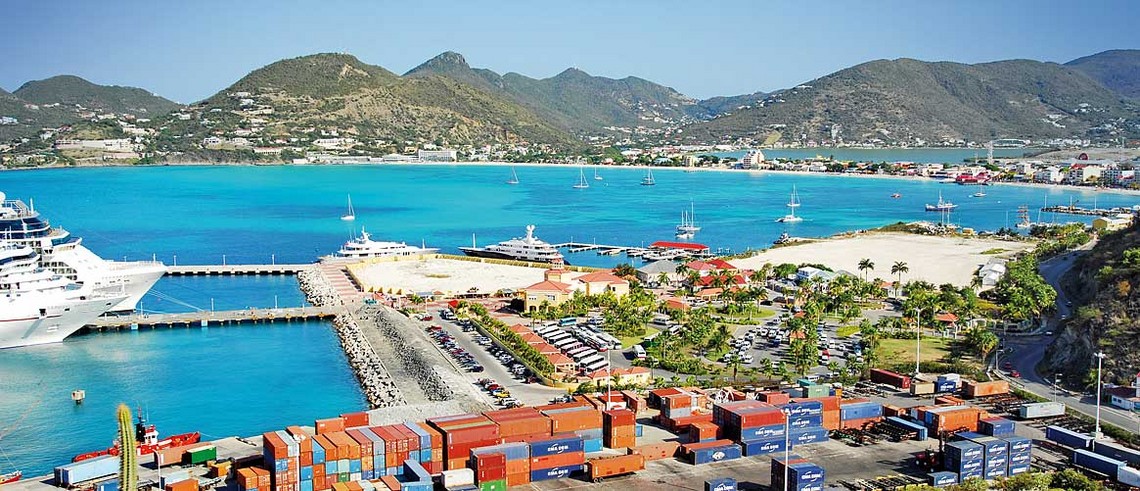“Politics used harbor as sugar daddy”

PHILIPSBURG – The Public Prosecutor’s Office has dropped its demand that the supervisory board of the harbor group of companies be sent home but it maintains that Chief Executive Officer Mark Mingo remains suspended. On Thursday, the Common Court of Justice handled the request from prosecutors to initiate a civil enquiry into possible mismanagement at the port, a move the harbor opposes, saying that there is nothing more to investigate. The court will render its decision on June 26.
The solicitor-general told the court that the proposed inquiry aims to create clarity about internal decision making processes at the harbor, about tenders and about the harbor’s true financial situation.
“This is an important request; it touches upon the future of St. Maarten. The management of the harbor must be thoroughly examined and tackled,” he said, adding that the harbor companies are the “cylinder block” of the country’s economy, that it should be under the control of qualified managers and that is should not be used as “an ATM.”
“The harbor has been used by politics as a sugar daddy to pay for infrastructure. If this goes on, the companies will come to a grinding halt; and then the tax payers can pay to keep them alive.”
The prosecutor’s office wants to bring all fourteen harbor entities under the scope of the civil inquiry. These entities include the Holding Company, Cruise Facilities, Cargo Facilities, the Simpson Bay Causeway NV and the Simpson Bay Lagoon Authority Corporation.
The prosecutor’s office used two attorneys from the law office of VanEps Kunneman Vandoorne to present its case to the court – Rogier van den Heuvel and Roderik van Hees. Chris de Bres (HBN Law) represented the harbor companies.
Members of the supervisory board and Minister Cornelius de Weever, the government’s shareholder representative for the harbor – and his attorney Jairo Bloem were also present.
The charges against the harbor, and in particular against its suspended director Mark Mingo are serious. ‘There is proof for $13 million worth of fraud, committed by, on the order of or with knowledge by the chairman of the management board Mingo,” attorney Van den Heuvel told the court. Other issues – annual accounts that are published far too late, corporate governance rules that are not followed and a lack of transparency also trigger many questions and justify an inquiry, he said.
Because the port has taken a number of measures that are in line with the measures the prosecutor’s office intended to demand from the court, many of the provisionary measure-request – like sending the supervisory board home – have been withdrawn. What remains is the demand for Mingo’s continued suspension and the appointment of a compliance officer and an ombudsman.
Van den Heuvel wondered why Mingo is not simply fired. Waiting for the outcome of the criminal court procedure, including appeals, could take years and all that time Mingo would sit at home and continue to receive his salary.
The harbor has two candidates for the functions of compliance officer and ombudsman and is prepared to make the appointments. The names of the candidates were not mentioned in court, though they have been provided to the prosecutor’s office.
The harbor seems to be of two minds about the civil inquiry, Van den Heuvel said. “On the one hand there is now a board that says to be shocked about Mingo’s fraud and on the other hand the defense suggests that the harbor still has no appetite for prying eyes.”
Attorney de Bres acknowledged that part of the accusations against the harbor are founded. “An investigation into those accusations does not have any added value because all facts are already known,” he said.
But Van den Heuvel presented a different point of view. “Not all things that went wrong are completely clear. The shameless fraud that appeared from the Emerald-investigation, and that continued during the investigation, suggests that we have only seen the tip of the iceberg. An investigation will have to bring the rest of that iceberg to the surface and that is very necessary.”
The prosecutor’s office objectives with the civil inquiry are four-fold. It aims to restructure and restore healthy relationships within the company, establish transparency, determine who is responsible for possible mismanagement and let the inquiry have a preventive effect.
“The inquiry will enable the harbor to claim the damages it suffered from ten years of mismanagement from those responsible,” Van den Heuvel said.
Measures the court could take to restore order at the harbor are the dismissal of Mingo and voiding décharge decisions. “The harbor says that it has sent out letters to safeguard its right to claim damages,” the attorney said. “The harbor should therefore welcome an inquiry; it should want to know if not many others have defrauded the company as well instead of doing its utmost to prevent an inquiry or to limit it as much as possible.”
Attorney De Bres noted that an investigation into everything that has happened at the port since 2009 in the fields of corporate governance, transactions and projects would cost “a lot of time, money and attention. These are scarce resources that are needed for the recovery process.”
De Bres said that the harbor suffered $25 million in damages during Hurricane Irma. “The harbor expects that she will only be back on the level of early 2017 by 2020, assuming that the recovery process goes according to plan. The question is therefore whether ordering an inquiry is a proportionate measure.”
De Bres said that the position of director Mingo – who is suspended but still paid his full salary every month – depends on the outcome of the Emerald-trial. “As soon as that ruling is there the position of the CEO can be definitively determined and decisions can be taken about claiming damages.” The attorney suggested that these actions will become possible after a ruling by the Court in First Instance.


























